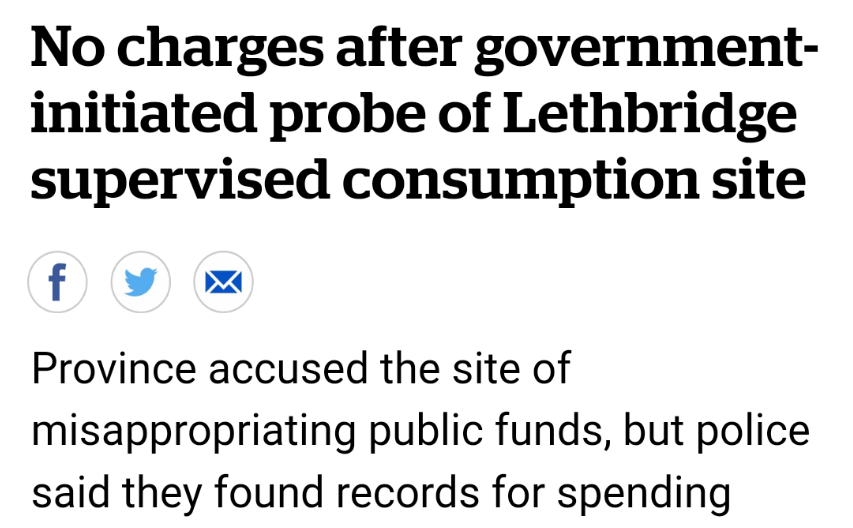
Link below if you are able to follow along! I'll live tweet to help add some context. 🧵
#YYC #Alberta #Addiction #Incarceration
#YYC #Alberta #Addiction #Incarceration
Coming out of the gates with addiction/mental health framing, which is extremely corrosive, as it ignores the primary reason why people are dying: a poisoned unregulated drug supply.
Milliken: "addiction, homelessness, and public safety issues" -- they're doing everything they can to conflate these three things.
This is wrong: by far, the people in greatest danger are those whose basic needs aren't being met, and it's because we turn our back on them.
This is wrong: by far, the people in greatest danger are those whose basic needs aren't being met, and it's because we turn our back on them.
"Calgary Public Safety and Community Response Task Force": four pillars including treatment, addiction, mental health and homelessness. Again, conflating these things.
Jeremy Nixon up next (Min. Seniors, Community & Public Services). Congratulates everyone on the collaboration, which in reality looks more like back-door bullying and threats of pulled funding.
Looks like Sonya Sharp and Andre Chabot are the two #yyccc councillors hand-picked by the UCP to lend legitimacy to this task force. I assume they were not voted to it by the council at large, as in the case of the #yegcc.
edmonton.ctvnews.ca/not-approved-b…
edmonton.ctvnews.ca/not-approved-b…
Jeremy Nixon taking lots of time to talk about the Mustard Seed (3 mentions already), which his family founded and which has repeatedly been picked for programming by the province since 2019.
"at the Boys & Girls Club where 65% of my youth were Indigenous" -- your youth?
4th mention of Mustard Seed by Nixon.
4th mention of Mustard Seed by Nixon.
No Mike Ellis today, and thankfully Chief Neufeld is not taking the mic. On Tuesday, EPS Chief McFee practically ran the event.
@alanna_smithh gets the first question, asking about the police hubs and whether there will be people forced into treatment via these hubs / correctional living units.
Milliken reframes her question: they're *helping people address their addiction*. Does not answer.
Milliken reframes her question: they're *helping people address their addiction*. Does not answer.
@alanna_smithh asks again. Milliken talks about the Virtual Opioid Dependency Pgrm, which we suspected long ago was being harnessed by police to force people onto treatment (sublocade, suboxone, e.g.). Now justifies all this "help" by talking about someone overdosing 3-4x /day.
@alanna_smithh Next question (sorry missed who asked - @Tommy_Slick?) - asks what metrics of success will be used. VERY IMPT QUESTION.
Milliken says that they have the most transparent data available for addictions. This is false. See here:
drive.google.com/file/d/1lqiMca…
Milliken says that they have the most transparent data available for addictions. This is false. See here:
drive.google.com/file/d/1lqiMca…
Next question is about transit safety - how does this affect transit? Milliken deflects to the public safety minister (Ellis).
Milliken now answering another question about the broader trends: "what we're doing with these task forces is to ensure the resources to be deployed are immediately available". This means locking people into addiction treatment once they're caught using drugs.
Rebecca Schulz: "the challenges we're seeing in each of the cities are unique". No, they aren't. It's a drug poisoning crisis driven by unregulated, toxic drug supply. That's the challenge. Treatment won't fix it.
Chief Neufeld now talking about coordination and alignment of all these organizations / political groups. Says many situations where police are not the right response, and he's glad people struggling with addictions as well as people who feel unsafe will get what they need.
@CBCScott asks if Mayor @JyotiGondek is aware this is all happening.
Schulz: she is aware and will be invited to the table... at some point.
Schulz: she is aware and will be invited to the table... at some point.
@CBCScott @JyotiGondek Dippel asks another, sorry missed it.
Schulz: talks about data within the recovery-oriented system of care, which doesn't exist. Again: drive.google.com/file/d/1lqiMca…
Schulz: talks about data within the recovery-oriented system of care, which doesn't exist. Again: drive.google.com/file/d/1lqiMca…
Next question: Any plans to increase supervised consumption capacity anywhere in the province?
Milliken: *will not say harm reduction*, instead "services that reduce harm". Says SCS are part of the system, they're always talking to stakeholders, if there are places w/ unmet need
Milliken: *will not say harm reduction*, instead "services that reduce harm". Says SCS are part of the system, they're always talking to stakeholders, if there are places w/ unmet need
Maybe Milliken missed that nearly 2,000 people died last year from drug poisoning in AB, and nobody has ever died of drug poisoning in a supervised consumption site?
@brodie_thomas question: Any legislative changes planned to hold someone involuntarily for treatment purposes?
Milliken: has been tasked with finding recommendations that could fall along these lines... we need "compassionate intervention mechanisms" for ppl OD'ing 3-4x/day
Milliken: has been tasked with finding recommendations that could fall along these lines... we need "compassionate intervention mechanisms" for ppl OD'ing 3-4x/day
@brodie_thomas Another from @brodie_thomas: essentially, wtf happened in Edmonton with the Mayor @AmarjeetSohiYEG being blindsided by this announcement?
Schulz: .........?
Schulz: .........?
Next question: What's the plan for availability of warming spaces?
Not sure who's answering, but they're saying "warming spaces are not the issue -- people who are suffering need access to services to help them change their lives." The warming space is a doorway to "recovery"
Not sure who's answering, but they're saying "warming spaces are not the issue -- people who are suffering need access to services to help them change their lives." The warming space is a doorway to "recovery"
Missed the last q, answered by Jeremy Nixon - something about workforce in social services. That's a wrap.
So very much the same as in #yeg. Here's what it boils down to, IMO:
So very much the same as in #yeg. Here's what it boils down to, IMO:
https://twitter.com/elsthomson/status/1602747548300894208?s=20&t=kS7eyNQ0QMtXv0b5bK82nA
• • •
Missing some Tweet in this thread? You can try to
force a refresh













